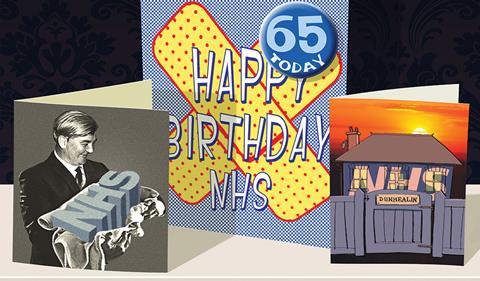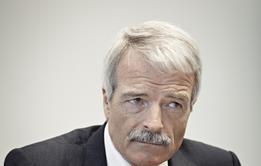As the NHS turns 65, what is the state of the service and what does its future hold? Former Financial Times public policy editor Nick Timmins speaks to health leaders on behalf of the Nuffield Trust for their assessment. HSJ presents edited highlights of his interview with Stephen Dorrell

Happy birthday NHS
The service has had − obviously − a period of institutional upheaval. But actually, from the point of view of the service that’s been delivered, it has been relatively calm over recent times. As the health committee has been saying since the beginning of this parliament, it’s becoming progressively more difficult as demand continues to rise, and given resources stopped rising some time ago. The challenges are coming to the surface.
The option of growth of real resources isn’t available in the medium term, so demand must be met by restructuring the way care is delivered: a process only now beginning.
That is politically difficult. But it is particularly hard if you don’t explain what is needed and involved, and if the public experiences changes in the way service is delivered just as cuts.
Muted messages
Quite a lot of the changes needed allow care to be delivered in a way that ensures higher or better outcomes in terms of patient experience and more objective clinical measures. But that message isn’t being delivered. You can’t expect people locally to engage with that message if the case hasn’t been made nationally.
Local politics is both top-down and bottom-up: it’s about public reaction, but reaction in the context of broader messages.
‘Primary, community, social care and social housing should all operate as one’
There’s an urgent requirement to see the care model change to reflect today’s burden of disease and technology so it becomes more of a genuine health and wellbeing service and less of a national emergency illness service. It’s a system designed, and still broadly good at, dealing with emergencies; it’s bad at preventing the emergencies arising in the first place. It’s bad at joining up the bits of the hospital service, primary care, community health and social care to support wellbeing rather than reacting to crisis.
It is an old observation that the system needs to treat people, not conditions.
One system, not four
I think I know what it should look like in 10 years time, and I think so do most people. What should be one system is currently, in fact, four systems all working in parallel, sometimes in competition but seldom together.
‘If the new structures succeed in creating a more clinically led commissioning process, that will have been a step forward’
Leaving hospitals out of it, primary, community, social care and social housing should all operate as one. They all have information at their disposal but they are not terribly good at using it within their own systems, and there’s almost no interchange between the four’s hermetically sealed information systems.
We talk endlessly about the need for more joined-up services led from the front and community end, which recognise early symptoms and then support people with care needs rather than waiting for them to need acute medicine. That way, we’d deliver a much better service from patients’ points of view.
How do we do that? Not by looking for the perfect managerial solution, because it doesn’t exist. Ask instead how we incrementally move in that direction.
The role of health and wellbeing boards
Starting from where we are, there’s a key role for health and wellbeing boards, which are the part of the system that are closest to the frontline management but can also look across the system’s different parts and also, importantly, have genuine democratic roots. They answer two weaknesses in the traditional system: firstly, looking across the silos; and secondly, having more democratic accountability than any part of the traditional NHS system. That’s a good thing and goes back to local politics being both top-down and bottom-up. You have to understand how people react but you also have to have something to say to them.
Given all the institutional upheaval, these boards have been expensively bought but are a step forward nonetheless. The changes on public health are for the better. And if the new commissioning structures succeed in creating a more clinically led commissioning process, that will have been a step forward. Those are the advances of the past four years.
Free or paid for?
Can the service remain largely free at the point of use? Different parts of the system have always been charged for and reviewed by governments, Labour and Tory, around care of the elderly and the classic NHS charged-for services − pharmacy, opticians and dentistry.
‘Charging for traditional definitions of acute medicine is almost missing the point. It’s putting the resource in the wrong place’
I’m not in favour of any radical new departures: it’s neither necessary nor desirable. If you look at the £125bn that we currently spend on these services and ask “how it is possible to use that resource more effectively?”, I’m not yet persuaded that it’s impossible to meet demand for the kind of service described out of that budget.
Looked at over the 65 years of the NHS, the money is a medium term constraint. We’re going through a prolonged period of depressed financial growth. But once the economy starts growing again, there will be a rational choice for resources available for health and care to resume growth in line with the economy.
Breaking down barriers
And it follows from breaking down the barriers between health and social care that more resource will go into social care, and that’s always been a charged-for service. The more you invest in effective social care, the more you relieve the pressure, the more you reduce the demand for acute medicine and you reduce the resource conflicts described.
Whatever the government thinks, consumers will spend more on care services, and expenditure on those services will enhance wellbeing and will reduce demand for acute medicine. So charging for traditional definitions of acute medicine is almost missing the point. It’s putting the resource in the wrong place.
The full text of all these interviews and others can be found in the Nuffield Trust’s Wisdom of the crowd: 65 views of the NHS at 65 report.
Stephen Dorrell is the MP for Charnwood and chair of the Commons health committee; Nick Timmins was public policy editor at the Financial Times
The NHS at 65: not ready to retire

‘The NHS is one of the noblest social institutions any country has ever created’
- 1
- 2
- 3
 Currently
reading
Currently
reading
'I'm not in favour of any radical new departures'
- 5
- 6






































No comments yet